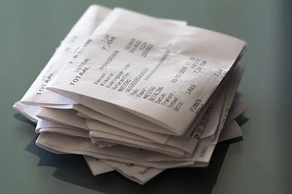Does the phrase “organize receipts” mean putting your receipts in a shoebox and then handing them over to your accountant?
If it does, then you may need a new strategy to organize your paperwork. You could be missing receipts or not get a crucial tax deduction because you didn’t write down the business reason or the franchise location the deduction was for.
The worst-case scenario is that you can’t prove that you had incurred the expenses and lose those deductions in an audit.
You can save yourself future headaches down the road by organizing your receipts. Your account will love you for it.
Read on to learn the top 7 tips to keep your business receipts organized.
What Are the IRS Requirements for Receipts?
Most small business owners know that you have to keep business receipts. A lot of business owners still fail to document the business purpose of the expense.
The IRS requires that to deduct for travel, meals, and entertainment, you have to show the business purpose. You also have to show how much the expense was for and the time and place the expense occurred.
Perhaps the biggest misconception about tax deductions is that credit card and bank statements provide enough evidence that it was a business expense. That you just kept your cash receipts, you’d be in good shape.
That’s not true at all. You can’t rely on bank and credit card statements to prove that you made the purchase for business purposes. You need to produce the documentation and the notes that detail what the expense was for and you have to meet the stringent requirements of the IRS.
Otherwise, you could get yourself in hot water down the road.
7 Tips to Organize Receipts
There are ways that you can avoid the shoebox method of organizing your receipts. This will help save you and your accountant time and energy when it’s tax time.
1. Take Excellent Notes
This is where a lot of business owners get tripped up when they need to produce their business receipts. They assume that there’s a low chance to get audited, so if they keep the receipts, they’ll be fine.
Since you have to tie the expense to a business reason, taking good notes about the expense is a sure way to avoid any future issues.
It also keeps you from having to refer to your calendar or wasting time trying to jog your memory about a lunch that happened almost a year ago.
2. Keep Envelopes for Receipts
To be on the safe side, you want to keep physical copies of your receipts along with your records. Instead of throwing them in a shoebox, organize them.
Putting them in envelopes can help you locate the receipts later on if you need to refer to them. It’s also easier to enter them into your bookkeeping system.
You can categorize them by monthly expenses or by categories that match your chart of accounts in your accounting system. You can get a little more detailed and separate your expenses by location, too.
3. Store them In Your Accounting Software
Perhaps the easiest way to keep your receipts organized is to make a note on the receipt, scan it, and upload it to your accounting software. This is great for both small businesses with one or multiple locations. You can immediately categorize the purchase and apply it to the correct business account or location.
As part of your system, you can choose to do this once a week, or you can do it as soon as you get the receipt. The key is to develop a system that will work for you.
4. Build a New Habit
As you build a system that works for you, you need to stick with that system. It’s all too easy to get sidetracked running your business and revert back to the old shoebox.
Building a new habit is hard. You need to experiment with different systems before you find one that works for you. When you do, make it a point to stick with it.
5. Hold on to Receipts for 7 Years
Don’t throw away your receipts and other documentation for your business. You need to hang onto your paperwork for at least seven years, according to the IRS. Make sure that they’re stored and filed away in a safe place that’s easy to access.
6. Keep a Business Journal
You need to provide supporting documentation about your business expenses. A business journal can serve that purpose. It also serves a couple of other purposes.
It helps you discover how you’re spending your time and how you’re growing your business. This can be in the form of a calendar. That can detail who you’re meeting with and the business purpose behind the meetings.
7. Keep Your Filing System Organized
One last thing that you can do is to keep your filing system organized. You can organize receipts and keep them in envelopes. If your envelopes can’t be found because they’re misplaced or unorganized, that makes your job that much harder to produce receipts.
You need to keep your systems organized. You can have a filing cabinet that you use for business receipts and other documents. Your job is to file them correctly the first time.
Don’t get lazy and put files and papers in their wrong place thinking that you’ll fix it later. You won’t and you won’t be able to find your papers when you need them.
Keep Your Paperwork Organized
There’s nothing scarier than getting your taxes audited by the IRS and having to prove that you incurred business expenses.
When you organize receipts, you make life easier on yourself and on your accountant.
Ceterus specialized in working with multi-unit franchisees to deliver an easy to use accounting solution. You know exactly how each franchise is doing and you can make tracking those receipts painless.
